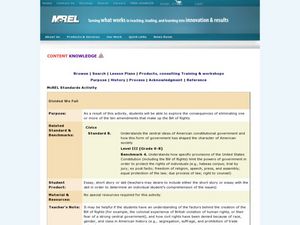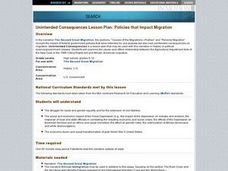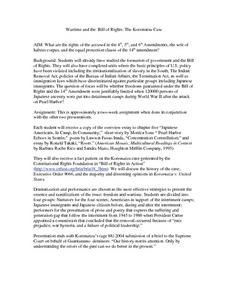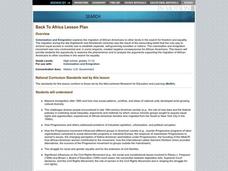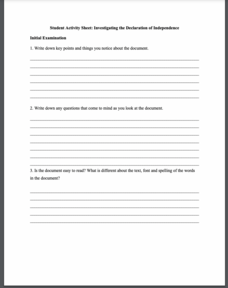Curated OER
Divided We Fall
Middle schoolers investigate the consequences of eliminating one or more of the amendments to the Bill of Rights.
Curated OER
Unintended Consequences: Policies that Impact Migration
Students examine the cause-and-effect relationship between the Agricultural Adjustment Acts of the New Deal or the 1965 Voting Rights Act and African-American migration. They write an essay evaluating the effectiveness of the Voting...
Curated OER
CIVIL DISOBEDIENCE
Students use events of the time to illustrate the significance of the 1965 Selma-to-Montgomery Voting Rights March.
Curated OER
Whole Child: Parenting Skills
Students and parents participate in a variety of activities intended to develop both the growth of the child and the parenting skills of the adult. They role-play daily activities, manipulate dough, discuss the rights and...
National First Ladies' Library
Government: Defending the Bill of Rights
Pupils examine the proposition of a country without the Bill of Rights. In a role-playing activity, teams of learners gather information to build a case for retaining the Bill of Rights and present it before their congressperson.
Curated OER
Citizen Me
Fifth graders examine what it means to be a citizen. Using the Constitution, they discover the functions and purpose of government. They compare and contrast the difference between a democracy and a monarchy. As a class, they discuss...
Curated OER
The Supreme Court
Students examine the Fourteenth Amendment. In this Supreme Court lesson plan, students define due process and equal protection as they analyze the impact of the amendment and the Supreme Court on workers' rights in the early 20th...
Curated OER
Getting to Democracy
Students define democracy and analyze the conditions needed for democracy to flourish. Students research governments in the Middle East to determine how and if they have any form of democracy within their government.
Curated OER
The Struggle for Human Rights
Tenth graders identify and clarify a problem, an issue, or an inquiry. They identify the changing nature of families and women's roles in Canadian society. Pupils assess the interaction between Aboriginal people and Europeans. ...
Curated OER
The Government and Natural Rights
High schoolers are introduced to some basic ideas the Framers used in creating the kind of government they thought would best protect the natural rights of each individual and promote the good of all. At the conclusion of the lesson,...
Curated OER
How Does Government Secure Natural Rights?
Students explain why a government with a constitution is not necessarily a constitutional government, and identify alternative models of government that the Founders had to choose from.
Curated OER
Can young people influence government?
Students, working as a whole class, think about and debate the question of influence. First, there will be some group work then a class debate. The question for debate is: Can young citizens have any influence on governments?
Curated OER
Wartime and the Bill of Rights: The Korematsu Case (Lesson 2)
Twelfth graders review how the government and Bill of Rights came into effect. Using primary source documents, they discuss if Japanese rights were violated when they were placed in internment camps after the bombing of Pearl Harbor. ...
Curated OER
Back To Africa
Students analyze the massive immigration after 1850 and how new social patterns, conflicts, and ideas of national unity developed amid growing cultural diversity, and how the Progressive movement influenced different groups in American...
Curated OER
The African-American Struggle for Equality in the World War II Era
Young scholars respect and appreciate the challenges people faced during World War II. They develop the different perspectives on race during WWII. Students develop that the nation's actions may not exemplify a nation's stated ideals....
Roy Rosenzweig Center for History and New Media
Investigating the Declaration of Independence
Teach your class about the Declaration of Independence while giving them practice working as a team. The resource breaks participants into groups and has them answer questions about specific grievances from the Declaration of...
Global Oneness Project
Repairing the Fabric of Democracy
During elections, headlines constantly lament the issue of low voter turnout. Help class members understand why this is such an important topic with relevant articles, a discussion of both sides of the issue, and a reflective essay.
Curated OER
Basic Concepts of Democracy
Bring the government to your classroom with this challenging activity. Great as either a review activity or a quiz, the activity contains ten questions about the philosophy and characteristics of a democratic government.
Curated OER
The Declaration Versus The Communist Manifesto
Upper graders put their knowledge of the U.S. Constitution to the test when they are asked to mark which of several statements are from either the Constitution or the Communist Manifesto. A class discussion follows. Use this resource as...
James Madison Memorial Fellowship Foundation
A Deliberate, Palpable and Dangerous Exercise of Other Powers: James Madison & Homeland Security
This resource uses primary source documents to explore the First Amendment. After reviewing key events of the 1790s, government or US history classes explore Madison's letter to Jefferson regarding the Alien and Sedition Acts. They then...
Curated OER
American Political Culture
Examine American political culture with your scholars using this self-assessment lesson. Individuals rate a list of 14 values from highest to lowest, including ideas such as financial security, right to private property, justice,...
Curated OER
What Would Hannah Think?
Students read excepts from various government documents on the issue of slavery in America. Using the internet, they research a topic related to slavery of interest to them and present to the class their findings. They examine the life...
Curated OER
Examining the Declaration of Independence
Students examine the Declaration of Independence and its significance to American history. They read the document, identify America's grievances with Great Britain, and restate a part of the document in their own words.
Curated OER
"I have a Dream"
Students analyze the famous "I Have a Dream," speech by Martin Luther King Jr., and discuss the progress made since then. In small groups, they read and discuss various documents, and formulate a plan of action to help realize Dr. King's...


